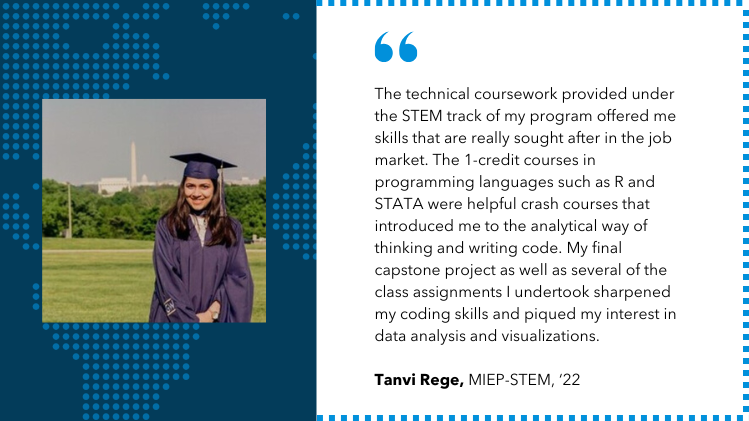International Economic Policy Master’s Programs
Programs Duration:
30 credits — typically completed in one and a half years (full-time); part-time option available.
Two Tracks:
M.A. in International Economic Policy
M.S. in International Economic Policy (STEM - designated)
Affiliation:
Partnership with the Institute for International Economic Policy (IIEP)
Course Scheduling:
Afternoon and evening classes designed for working professionals
In an era of economic uncertainty and global transformation, understanding international economic issues is more critical than ever for those who want to play an influential role in shaping policy that has a global impact. The International Economic Policy (IEP) programs at the Elliott School of International Affairs prepare students to analyze complex challenges and design effective, evidence-based solutions for today’s interconnected world.
Both programs are 30-credit degrees that can be completed in as little as one and a half years of full-time study, with flexible options for part-time students balancing work and academics.
- The Master of Arts (MA-IEP) provides a broad foundation in international economics, development, and global business, combining analytical coursework with applied learning experiences. Offers specializations in
- International Trade and Investment
- International Business and Finance
- Development Economics
- Quantitative Analysis
- Student-Designed Specialization
- The Master of Science (MS-IEP) offers a quantitative focus, emphasizing econometric and data-driven policy analysis. As a STEM-designated program, it allows international students to apply for an additional two years of Optional Practical Training (OPT) in the United States.
Both degrees equip graduates to lead with insight, rigor, and impact in the global economy.
The International Economic Policy Programs are the right master's degrees for you if ...
- You want to study economic policy with an international focus.
- You’re a few years into your career and realize you need the right credentials, skills, and connections to advance.
- You’re finishing your undergraduate degree in economics, business, or a related field, and you want to move on to a graduate program that offers expertise and real-world work experience on a global scale.
- You previously studied international affairs or other fields, but now realize that an economic focus is key to advancing your career.
- You want to earn your master’s degree in international economic policy in the nation’s capital with access to some of the world’s most influential institutions, including the World Bank and the International Monetary Fund.
- You’re interested in an expedited master’s program that will allow you to graduate in a year and a half.
- Apply to the Master of Arts if...
- You enjoy analyzing economic trends on a global scale.
- You want to analyze and address global challenges, such as poverty reduction, environmental sustainability, economic inequality, and international conflict.
- You’re interested in a program that does not require prior knowledge of calculus or intermediate-level microeconomics and macroeconomics.
- You want to choose an area of professional specialization and tailor your master’s degree to your specific interests, such as Economic Development, International Business and Finance, and International Trade and Investment Policy.
- Apply to the Master of Science if...
- You are interested in policy evaluation, economic forecasting, or designing solutions to global challenges like poverty, inequality, or trade disputes.
- You are interested in data-driven decision-making or economic research.
- You would like to develop strong math and analytical skills, working with economic models, statistical methods, and policy evaluation tools.
- You are interested in using computational models to assess the impact of economic policies or predict outcomes.
- You are eager to work with large datasets to extract insights on market trends or policy effects.
- You’re an international student looking for a STEM designated program in order to be eligible to apply for two additional years of work in the United States.
The Elliott School’s MIEP degrees ensure you have the skills you need to help shape solutions to global economic challenges in the areas of government, finance, consulting, NGOs, and international organizations.
Explore your course requirements for...
Sample Specialization/ Elective and Skills Courses
Capstone Experience: The MIEP Capstone is the culminating experience for students in both the Master of Arts (MA) and Master of Science (MS) in International Economic Policy programs. It provides the opportunity to apply knowledge and skills acquired in the program to a complex, real-world policy challenge.
Master's Program Prerequisites
- Master of Arts Prerequisites
Economics
Course background in economics (micro- and macroeconomics) is a prerequisite to help prepare students to complete the graduate-level economics course(s) required within the M.A. in International Economic Policy curriculum. Course(s) must be successfully completed (grade of C or higher) through a regionally accredited institution in:
- Introductory Microeconomics
- Introductory Macroeconomics
Spring applicants must fulfill this prerequisite at the time of application.
Fall applicants may be admitted even if they have not fulfilled the economics prerequisite. In this case, the student is required to take the course(s) at a regionally accredited college/university prior to enrollment at the Elliott School. It is the student’s responsibility to complete the required coursework before classes begin.
AP credit cannot be used to meet the Economics Prerequisite. The Elliott School will not accept courses taken through services such as Coursera, Udemy, and other massive open online course (MOOC) services.
- Master of Science Prerequisites
Introductory Economics
Course background in economics (micro- and macroeconomics) is a prerequisite to help prepare students to complete the graduate-level economics course(s) required within the M.S. in International Economic Policy curriculum. Course(s) must be successfully completed (grade of C or higher) through a regionally accredited institution in:
- Introductory Microeconomics
- Introductory Macroeconomics
Applicants must fulfill the introductory economics prerequisite at the time of application.
AP credit cannot be used to meet the introductory economics Prerequisite. The Elliott School will not accept courses taken through services such as Coursera, Udemy, and other massive open online course (MOOC) services.
Intermediate Economics and Calculus
Course(s) must be successfully completed (grade of C or higher) through a regionally accredited institution in:
- Intermediate Microeconomics
- Intermediate Macroeconomics
- College-Level Calculus
Spring applicants must fulfill the intermediate economics and calculus prerequisites at the time of application.
Fall applicants may be admitted even if they have not fulfilled the intermediate economics and calculus prerequisites. In this case, the student is required to take the course(s) at a regionally accredited college/university prior to enrollment at the Elliott School. It is the student’s responsibility to complete the required coursework before classes begin.
AP credit cannot be used to meet the intermediate economics or calculus prerequisites. The Elliott School will not accept courses taken through services such as Coursera, Udemy, and other massive open online course (MOOC) services.
Learning, living, and working in the hub of thought leadership and global policy
A master’s degree in International Economic Policy from the Elliott School affirms you are knowledgeable in the areas of foundational economics, quantitative and descriptive analysis, and with the skills and connections needed to be competitive in the job market.
Differentiate yourself with the right degree and relevant, real-world work experience
When you graduate…
- You will have a skillset that is both practical and always in-demand as you pursue a career in public service, business, management consulting, development agencies and international organizations.
- You will have a deep understanding of global dynamics, positioning you to make a long-term impact. You will have a credible voice and seat at the table with your technical background and policy analysis tools.
- After demonstrating your abilities through your capstone, you will have the background sought by some of the world’s most prominent organizations, including the World Bank, U.S. International Trade Commission, Booz Allen Hamilton, the International Monetary Fund, IBM, and more.
- You will be well connected through a network of professionals and friends, and you will have lifetime access to career counseling, workshops, site visits, and information sessions with our Graduate Student Services office.
Career Placement After Graduation
A course of study designed for global impact
Advance in your career or internship while you earn your master's degree.
You can earn your degree in as little as one and a half years through evening classes that can accommodate even the busiest of schedules. Students may also work full time while completing the program on a part-time basis.
The program includes core courses in international trade, international macroeconomics, and development economics taught by GW faculty with deep experience in academia and policy making. You’ll develop an understanding of international economics theory, frameworks, models, and application practices. Courses in business and statistical analysis provide further training in skills critical to global economic policy.
Learn from experts in the field of international economic policy.
You’ll be guided by full-time GW faculty who are scholar-practitioners. They are seasoned experts in international economics; they are active in shaping policy and bringing real-world learning to the classroom.
Some of the respected names include Maggie Chen, Remi Jedwab, Graciela Kaminsky, Stephen B. Kaplan, Rafael Lopez-Monti, Mike Moore, Jay Shambaugh, Steve Suranovic, and many others.
Access career resources and influential organizations.
By being part of the Elliott School community in Washington D.C., you will have access to world-shaping speakers and guest lecturers. You will be able to attend events and classes at other GW schools. Within a 10-minute walk from GW’s campus are many of the key players in international economics — the IMF, World Bank, the White House, the Fed, Treasury, USTR, Washington International Trade Association, and others. Career coaches in the Elliott School’s Graduate Student Services office will help you make key connections and find relevant opportunities.
GW’s Institute for International Economics Policy
Through GW’s Institute for International Economics Policy, you can go deeper into research, attend events, and make meaningful connections. IIEP:
- Serves as a catalyst for high quality, multi-disciplinary and non-partisan research on policy issues surrounding economic globalization
- Hosts dozens of high-profile events yearly and supports a wide variety of GW faculty focused on issues such as international trade policy, international macroeconomics development economics and international political economy
- Gives MIEP students the opportunity to participate in research projects conducted by Institute researchers and attend the extraordinary events organized by IIEP
ITIP Legacy
Prior to academic year 2019, this program was called “International Trade and Investment Policy” affectionately known to alumni and faculty as ITIP. The ITIP program had a twenty-year history of training outstanding professionals in the broader field of international economic policy. While the name has changed, the MIEP and ITIP student body and alumni network combine the best features of the Elliott School: rigorous academics, strong professional development, and dedication to understanding the complexities of global challenges.
Contact Us
The graduate admissions counselors are some of the exceptional resources available to you through the Elliott School of International Affairs. Contact us directly with your requests or questions about the MIEP program. We’ll help you explore the benefits, align this opportunity with your career goals, or compare the MIEP degree with our other master’s programs in international affairs.
Call: (202) 994-7050
Email: esiagrad gwu [dot] edu
gwu [dot] edu
Information Session: Join us for an information session to speak with an admissions counselor.




